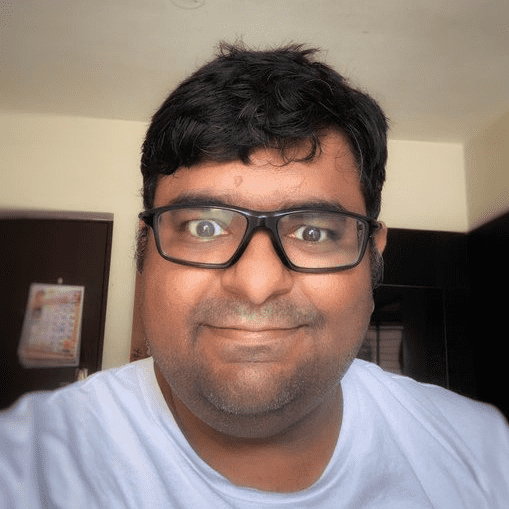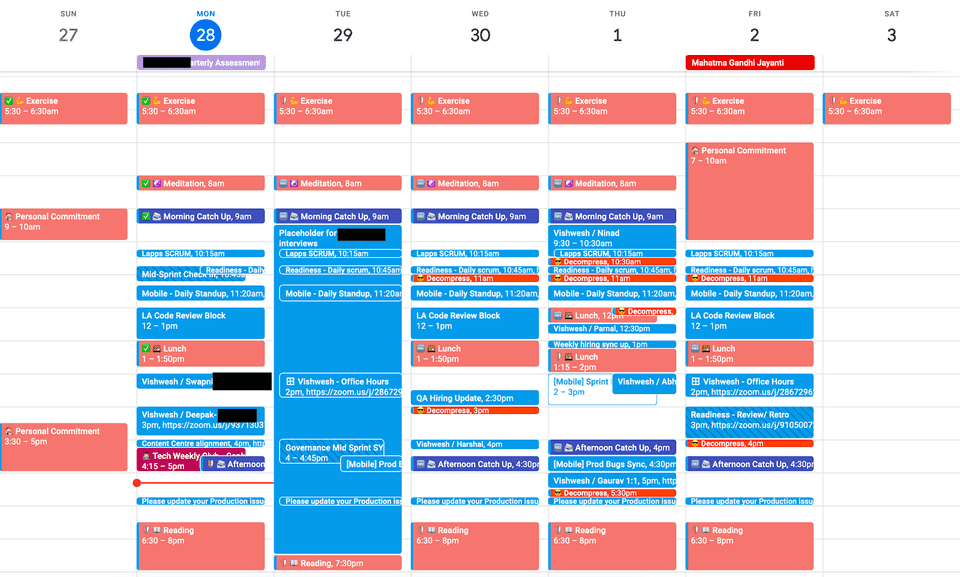PS: If you’re new to MicroBytes here’s a super short intro
Vishwesh is the Vice President Of Engineering at MindTickle. Prior to MindTickle, he was a site lead, EM for Slack’s Pune office. Before that Vishwesh also worked at Microsoft, he led engineering teams for Microsoft Outlook on iOS and Android.
He is also an angel investor and enjoys working with ambitious entrepreneurs on disruptive solutions in mobile, enterprise SaaS, and the consumer internet.
In just 512 words he shares:
- How to give better answers, and ask better questions
- What common mistakes he sees young developers make
- The essential tools he uses to organize work and get things done
And more…
Enjoy!
Thank you, Vishwesh
let’s get started:
“What’s your work routine?”
Recently I have shifted to a complete calendar-based routine. My day starts at 5-5:30 a.m. and work usually starts at around 9 a.m. Here is a quick glimpse into what my calendar looks like -
I have everything on my calendar — all my official meetings, office hours, personal planned activities, lunchtime, reading time, etc. Most of my personal commitments are flexible and adjust themselves if there is a high priority work meeting, so others can book my time during that slot if they want to (I use a tool called reclaim.ai ). I don’t forget to “Decompress” after meetings (take a short walk or have coffee or just drink water, close my eyes and relax :) )
”What do you know about your work now that you wish you’d known when you first started?”
My biggest learning is — What people expect from me is the “right answer”, “well-researched answer” and not the “quick answer”. The reason I say this is because earlier in my career or even until a few years ago, I used to always be on my toes to reply whenever someone asks me something.
Imagine you get a Slack DM from someone, the older me would have tried answering ASAP to whatever is being asked; but the new me reads it, reads it thrice so that I understand what is really being asked, do I really know the answer, I then reverify what I’m going to answer. If it’s not a high priority — sleep over it and then answer.
This has improved my ability to answer well which has helped me also ask better questions.
”What book has helped you the most over your career?”
I read/listen a lot. It is hard to point to 1 book but I will propose 5 :)
Growing up as an engineer the first book I read and was awestruck was Donald Knuth’s “The Art of Programming” (I know I am old :) )
Then comes Clean Code: A Handbook of Agile Software Craftsmanship by Robert C. Martin aka ‘Uncle Bob’ was my favorite (I used it as a bible). I recommend reading all of Uncle Bob’s books!
I also cherished SICP (Structure and Interpretation of Computer Programs) a lot and have gifted it to so many young engineers I have met over the years.
In recent years I was very impressed with the book The Effective Engineer By Edmond Lau and An Elegant Puzzle: Systems of Engineering Management By Will Larson.
“What are some common mistakes you see young developers make?”
Discipline is something that I have seen lower on the priority list of young engineers. It is the best quality in an engineer which I always seek while hiring.
Integrity is more important, in fact it’s more important than sincerity IMO.
Accountability - Everybody takes responsibility, very few are ready to take accountability.
Do not and I mean never hesitate to ask for help. I see young engineers hesitate to ask for help.
“And your parting piece of advice?”
Instead of focusing more on Technology focus on what users want, the business wants. This is something even I learned the hard way in my early years and I always encourage young engineers to focus on all (360 degree) aspects of building and selling the product. Remember technology is just a tool to achieve the final goal.

